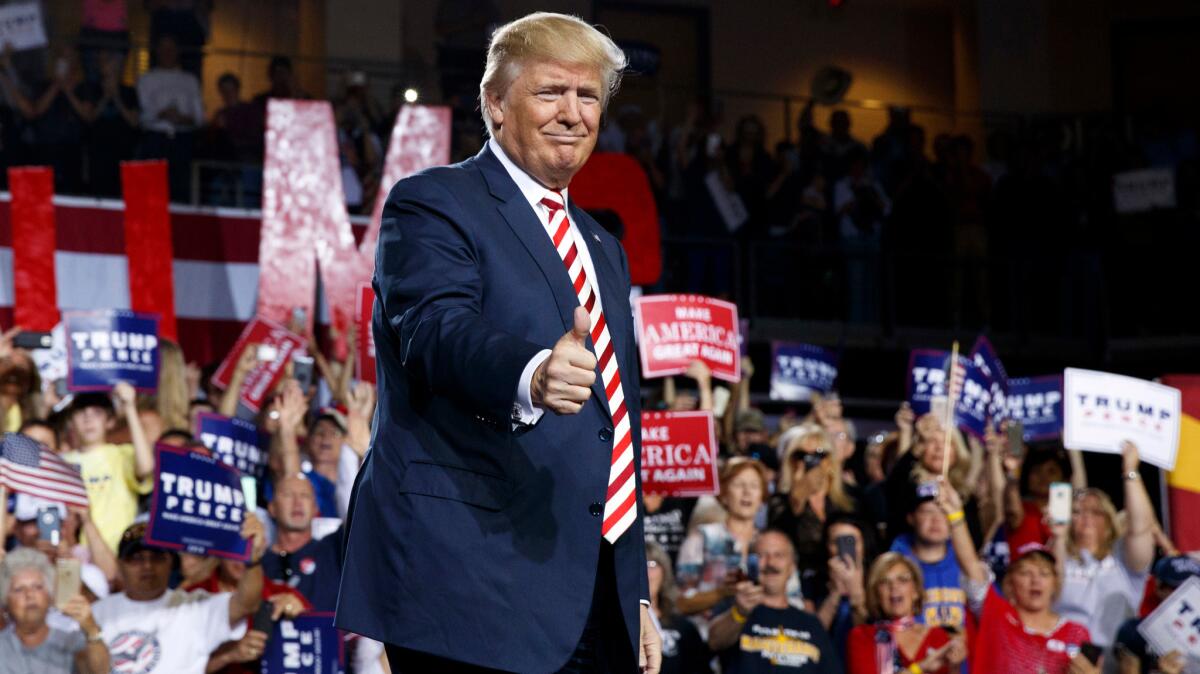Column: How Donald Trump’s tax proposals would help Donald Trump

“The unfairness of the tax laws is unbelievable,” Donald Trump told supporters in Colorado this week. “I’m a big beneficiary. But you’re more important than my being a beneficiary, so we’re going to straighten it out and make it fair for everybody.”
Let’s acknowledge that when Trump claimed almost a billion dollars in business losses on his 1995 tax returns, that was perfectly legal, assuming the losses were real. (It didn’t quite make him a “genius,” as his allies claimed; if there was a genius, it was his tax accountant.)
And let’s give Trump credit for agreeing that the tax laws – including the ones that allowed him to pay no federal income taxes for several years – are unfair.
It’s unfair that a real estate investor like Trump can deduct all his losses against ordinary income; other taxpayers can’t do that. It’s unfair that he can sell a casino at a loss and take a tax deduction, when an ordinary homeowner who sells her house at a loss takes a bath.
But Trump has promised to fix that unfair system, even if it hurts his own wallet. “My tax plan is going to cost me a fortune,” he bragged last year.
Except it won’t – not as far as anyone can tell. (It’s hard to know for sure, of course, since Trump still won’t release his tax returns.)
Many of the changes Trump has proposed would actually reduce his tax bill – if he ever had one, that is.
Instead, many of the changes Trump has proposed would actually reduce his tax bill – if he ever had one, that is.
Trump’s tax plan would lower the top rate on ordinary income from 43.6% to 33%; assuming he earned enough for the top rate and paid income taxes, that would give him a windfall. He’d lower capital gains taxes too.
There’s more. Trump has proposed dropping the tax rate of businesses like his to as low as 15%, although his campaign has issued contradictory signals on whether he intends to keep that proposal. (Tax experts in both parties hate the idea, because it would give ordinary taxpayers a huge incentive to declare themselves small businesses.)
Trump would repeal the estate tax too – a boon to his heirs. (But he would subject them to capital gains taxes if they sold any of their inheritance, a sensible proviso.)
All those measures would help Trump, not hurt him.
It’s not as if Trump has proposed to trim any of the real estate-friendly provisions that help him avoid taxes.
“There’s nothing in the Trump tax proposals that would cut back on all the special tax subsidies for real estate investment,” USC professor Edward Kleinbard, an expert on tax law, told me Tuesday.
Some Republicans are in favor of at least modest reforms.
House Republicans have proposed a tax plan endorsed by Speaker Paul Ryan that would limit the “loss carryover” provision that Trump has used. Under current law, Trump (or any other real estate professional) can not only carry losses forward for 15 years, but can also use them to cancel out income from two years in the past. The House GOP plan would eliminate the two-year “look-back.” Trump’s plan doesn’t mention it.
In an even bigger change, the House GOP would bar businesses from deducting interest on loans to reduce the incentive for them to pile up debt. (The House plan allows businesses to expense their investments instead.) That would be a big hit to debt-dependent real estate tycoons like Trump and — surprise, surprise — he refused to get on board with that proposal.
One more thing: according to the conservative-leaning Tax Foundation, Trump’s tax plan would blow a giant hole in the federal budget: cutting revenue by at least $2.6 trillion over 10 years.
That might make small-government advocates happy — but it would make it impossible for Trump to keep his promises to preserve Social Security and Medicare and increase defense spending.
I asked the Trump campaign on Tuesday if any of his tax proposals would cost him real money.
Remember, this is the candidate who said: “My tax plan is going to cost me a fortune.”
I got no response.
Candidates’ tax proposals rarely become law, of course. Congress, aided by armies of eager lobbyists, will spend months laboring over every clause.
That’s true of Hillary Clinton’s tax plan, as well. (Hers, built on Democratic boilerplate with a dose of Bernie Sanders, would raise tax rates on high-income taxpayers, increase the holding period for long-term capital gains taxes to six years, and increase the estate tax instead of repealing it.)
But they are windows into the candidates’ minds — and, arguably, into their characters as well.
Clinton’s tax proposals would actually cost her money.
Trump says his plan would too — but it’s not true.
Twitter: @doylemcmanus
Follow the Opinion section on Twitter @latimesopinion and Facebook
More to Read
A cure for the common opinion
Get thought-provoking perspectives with our weekly newsletter.
You may occasionally receive promotional content from the Los Angeles Times.







